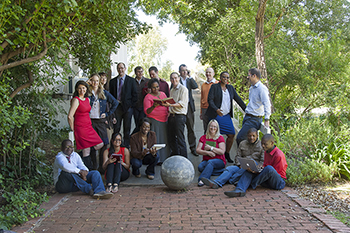Latest News Archive
Please select Category, Year, and then Month to display items
12 January 2024
|
Story Nonsindiswe Qwabe
|
Photo Sonia Small
 Since joining the UFS in 2008, Dr Grey Magaiza has worked extensively on approaches that can foster the socio-economic transformation of societies.
Since joining the UFS in 2008, Dr Grey Magaiza has worked extensively on approaches that can foster the socio-economic transformation of societies.
“The future should be one where communities can decide on their development agenda and futures. That’s the most important for me.” Dr Grey Magaiza, Deputy Director of the Centre for Gender and Africa Studies (CGAS) and Head of the Community Development programme on the Qwaqwa Campus, is passionate about capacitating communities to be agents of change and advancement. His vision for the future emphasises the empowerment of communities to take charge of their development by actively participating in decision making and the implementation of development projects that can improve their lives.
Since joining the UFS in 2008, Dr Magaiza has worked extensively on approaches that can foster the socio-economic transformation of societies. Over the years, he has crafted his research speciality into one that he is most proud of – being an interdisciplinary scientist immersed in the development of communities.
“I’m in a fortunate position of researching what I like. I say ‘fortunate’, because I’ve taken the time to understand what I’m passionate about, which is the overall field of rural livelihoods and livelihood futures – in short, community development. My research starts from an engaged university, understanding the elements that a university must use to enhance transformation and relevance to its immediate community in terms of development.”
One of the ways he has done this is by looking at social entrepreneurship as a development approach for young people in a rural setting. Through workshops with non-profit and civic organisations in Qwaqwa, Dr Magaiza has been helping these organisations to map out their needs and actively meet them through the involvement and support of external role players.
“We understand that communities are part of the national development agenda, but even that national agenda respects community knowledge and intentions and allows communities to shape their identity. A critical enabler of this is community organising. You bring back the capacity in communities to have dialogues on issues affecting them as spaces for engagement, knowledge exchange, and for people to just talk about their way forward.”
By enabling communities to define their development agenda, they can address their specific needs, challenges, and aspirations, he said. “When I look at livelihood futures, it’s quite an exciting aspect of my work – it’s like looking into a fortune tellers’ globe, because you’re not deciding for communities what they should do, but the communities themselves take those decisions.”
Prestige Scholars Programme invests in promising academics
2015-06-24

Photo: Sonia Small |
Whilst many academics find it challenging to have sustainable funding for specific projects, it is often just as challenging to find relevant exposure and good mentorship programmes to fully prepare academics toward becoming full professors.
Prof Jonathan Jansen, Vice-Chancellor and Rector of the UFS, designed the Vice-Chancellor’s Prestige Scholars Programme (PSP) specifically targeting newly-completed post-doctoral students who are already members of the academic staff.
The goal is to select the most promising young scholars and to make substantial institutional investment in their development.
To date, the PSP has produced 2 Fulbright scholars; 10 National Research Foundation (NRF) rated scholars; 1 NRF Blue Skies research project and 14 NRF Thuthuka-funded projects. These scholars work with the best academics at leading universities on three continents.
Prof Jackie du Toit, co-director of the programme, explains that while the PSP does not provide funding, it is a great programme to empower scholars by means of assistance towards generating funding from outside sources.
Prof Du Toit co-directs this programme with Proff Corli Witthuhn, Vice-Rector: Research and Niel Roos from the Department of Africa Studies.
“The PSP bases its approach to funding on the philosophy that young scholars are to be encouraged towards financial independence, based on a viable postdoctoral project that would sustain their scholarship for five to eight years post PhD. We believe that the cachet and long-term sustainability of existing funding programmes such as Fulbright outweighs the short-term benefits of automatic funding from the PSP. We also endeavour to teach young scholars to work cleverly within institutional parameters, rather than leave them floundering once they step off the active PSP.”